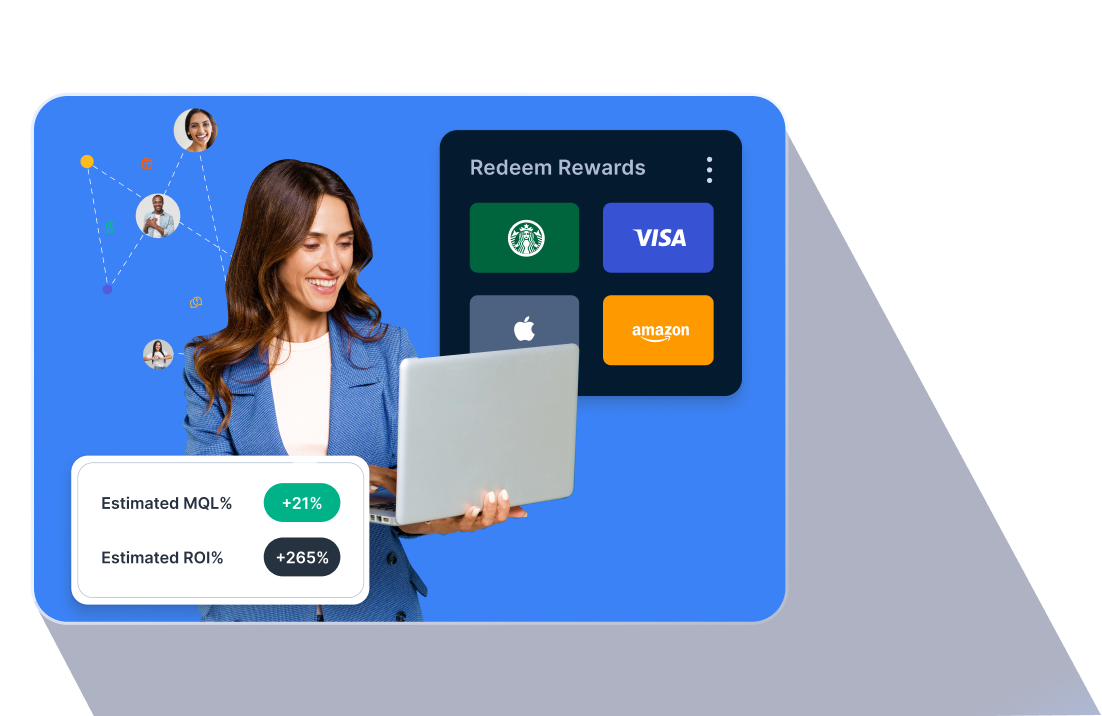
Glossary Terms
Plum - Rewards, Incentives and Payouts Platform
- Apakah kesetiaan jenama?
- Apakah tiga tahap kesetiaan jenama?
- Apa yang mewujudkan kesetiaan jenama?
- Apakah program kesetiaan jenama?
- Apakah perbezaan antara kesetiaan jenama dan kesetiaan pelanggan?
- Apakah 3 contoh kesetiaan jenama?
- Mengapakah kesetiaan jenama penting?
- Bagaimana untuk membina kesetiaan jenama?
Kesetiaan Jenama
Kesetiaan jenama melangkaui pembelian berulang sahaja. Ini adalah pengabdian pelanggan yang tidak berbelah bahagi kepada jenama, dicirikan oleh emosi positif dan keutamaan untuk produk atau perkhidmatan mereka berbanding pesaing.
Apakah kesetiaan jenama?
Kesetiaan jenama adalah perasaan positif berterusan pelanggan terhadap jenama yang biasa. Ini diterjemahkan ke dalam pembelian yang konsisten, tanpa mengira kelemahan kecil, tindakan pesaing, atau turun naik harga. Ia didorong oleh persepsi keunggulan jenama dari segi kualiti, perkhidmatan, nilai, atau hubungan emosi.
Apakah tiga tahap kesetiaan jenama?
Kesetiaan jenama boleh dikategorikan kepada tiga peringkat:
- Kesetiaan kognitif: Berdasarkan faktor rasional seperti kualiti produk, harga, dan kemudahan. Pelanggan memilih jenama kerana mereka percaya ia menawarkan nilai terbaik.
- Kesetiaan afektif: Didorong oleh emosi dan persatuan jenama yang positif. Pelanggan merasakan hubungan dengan jenama dan nilai-nilainya.
- Kesetiaan tingkah laku: Matlamat utama, di mana pelanggan secara konsisten memilih jenama dan mempromosikannya secara aktif kepada orang lain. Mereka menjadi penyokong jenama.
Apa yang mewujudkan kesetiaan jenama?
Kesetiaan jenama tidak dibina semalaman. Ini adalah kemuncak faktor-faktor yang memupuk pengalaman pelanggan yang positif dan hubungan emosi. Berikut adalah beberapa pemacu utama:
- Kualiti dan perkhidmatan yang unggul: Inilah asasnya. Produk yang secara konsisten memenuhi atau melebihi jangkaan, ditambah pula dengan perkhidmatan pelanggan yang luar biasa yang pergi lebih jauh, mewujudkan kepercayaan dan kepuasan.
- Sambungan emosi: Jenama yang bergema dengan nilai, gaya hidup, atau aspirasi pelanggan mewujudkan ikatan yang lebih mendalam. Humor, tanggungjawab sosial, atau rasa komuniti semua boleh menyumbang. Fikirkan komitmen Patagonia terhadap aktivisme alam sekitar atau perayaan Dove kecantikan sebenar.
- Pengalaman positif: Setiap interaksi pelanggan membentuk persepsi mereka. Pengalaman dalam talian yang diperkemas, kakitangan yang berpengetahuan dan membantu, atau pulangan tanpa kerumitan semuanya menyumbang kepada persatuan jenama yang positif.
- Persepsi nilai: Pelanggan perlu merasakan bahawa mereka mendapat nilai wang mereka. Ini merangkumi bukan sahaja harga, tetapi juga kualiti produk, perkhidmatan, dan pengalaman jenama.
- Ganjaran dan pengiktirafan: Program kesetiaan dengan faedah menarik memberi insentif kepada pembelian berulang dan membuat pelanggan berasa dihargai.
Apakah program kesetiaan jenama?
Program kesetiaan jenama adalah strategi pemasaran berstruktur yang direka untuk menggalakkan perniagaan berulang dan memberi ganjaran kepada pelanggan setia. Program-program ini menawarkan faedah seperti:
- Sistem mata: Pelanggan memperoleh mata untuk pembelian, yang boleh ditebus untuk diskaun, barangan, atau pengalaman eksklusif. (Contoh: Starbucks Ganjaran)
- Keahlian berperingkat: Tahap perbelanjaan yang berbeza membuka akses kepada pelbagai faedah, mewujudkan rasa eksklusif. (Contoh: Amazon Prime)
- Akses awal kepada jualan dan promosi: Pelanggan setia mendapat ringkasan menyelinap pada produk baru atau diskaun eksklusif.
- Tawaran peribadi: Program boleh menyesuaikan tawaran dan ganjaran berdasarkan keutamaan pelanggan individu dan sejarah pembelian.
Apakah perbezaan antara kesetiaan jenama dan kesetiaan pelanggan?
Kesetiaan jenama dan kesetiaan pelanggan sering digunakan secara bergantian, tetapi terdapat perbezaan halus:
- Kesetiaan pelanggan: Memberi tumpuan kepada pembelian berulang, sering didorong oleh faktor seperti kemudahan atau harga. Pelanggan boleh memilih jenama lazimnya tanpa hubungan emosi yang kuat. (Contoh: Membeli barangan runcit di kedai terdekat setiap minggu)
- Kesetiaan jenama: Mewakili sambungan yang lebih mendalam. Pelanggan secara aktif memilih jenama berbanding pesaing walaupun menghadapi sedikit kenaikan harga atau kesulitan. Terdapat lampiran emosi dan keutamaan jenama. (Contoh: Keluar dari cara anda untuk melawat kedai kopi tertentu yang anda suka)
Apakah 3 contoh kesetiaan jenama?
Berikut adalah beberapa syarikat yang terkenal kerana memupuk kesetiaan jenama:
- Apple: Identiti jenama yang kuat, produk inovatif, dan pengalaman pengguna yang lancar memupuk pangkalan peminat setia yang sanggup membayar premium.
- Amazon Perdana: Kemudahan, penghantaran pantas, tawaran eksklusif, dan akses ke perkhidmatan penstriman mewujudkan cadangan nilai menarik yang membuat pengguna ketagih.
- Kumpulan LEGO: Generasi telah membesar dengan LEGO, membina hubungan emosi yang kuat. Set berkualiti tinggi, inovatif dan fokus pada pengalaman bermain memastikan peminat terus terlibat.
Mengapakah kesetiaan jenama penting?
Kesetiaan jenama menawarkan pelbagai faedah:
- Peningkatan pendapatan: Pelanggan setia berbelanja lebih konsisten dan kurang sensitif harga.
- Mengurangkan kos pemasaran: Mengekalkan pelanggan sedia ada lebih murah daripada memperoleh yang baru.
- Pemasaran percuma: Pelanggan setia menjadi penyokong jenama, mempromosikan produk atau perkhidmatan anda melalui cadangan dari mulut ke mulut.
- Pandangan pelanggan yang berharga: Pelanggan setia memberikan maklum balas berharga yang boleh membantu membentuk strategi pembangunan dan pemasaran produk masa depan.
Bagaimana untuk membina kesetiaan jenama?
Membina kesetiaan jenama adalah maraton, bukan pecut. Berikut adalah beberapa strategi utama:
- Menyampaikan kualiti dan perkhidmatan yang luar biasa: Inilah asasnya. Secara konsisten memenuhi atau melebihi jangkaan pelanggan untuk membina kepercayaan.
- Menjalin hubungan emosi: Buat personaliti jenama yang bergema dengan khalayak sasaran anda. Membangkitkan perasaan positif dan membina rasa komuniti.
- Menawarkan program kesetiaan yang bermanfaat: Beri ganjaran kepada pelanggan berulang dengan mata, diskaun, atau faedah eksklusif untuk memberi insentif kepada naungan berterusan.
- Utamakan pengalaman pelanggan: Buat setiap interaksi, daripada melayari laman web anda untuk berinteraksi dengan perkhidmatan pelanggan, positif dan tidak dapat dilupakan.
- Terlibat secara aktif dengan khalayak anda: Memupuk komunikasi dua hala melalui media sosial, bertindak balas terhadap maklum balas, dan menunjukkan bahawa anda menghargai pendapat mereka.

